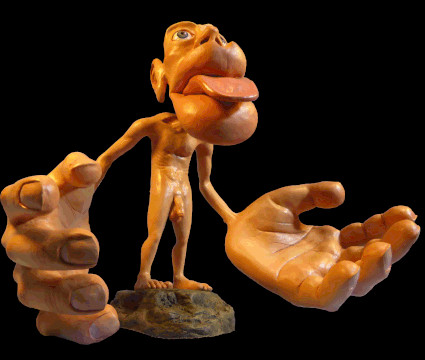Ego Death by Any Other Name
Dissolution, de-reification, depersonalization, non-dual experience, the oceanic state, psychic death...
When I first felt it, I had no word for it.
It was a sudden and shocking shift in perception, a completely new way of feeling. But it was oddly familiar, like a strange scent that transports you to some ambiguous, amorphous moment from childhood.
I was confused, trying to make sense of something I had no theoretical or experiential context for. My mind reeled with explanations: had I died? gone crazy? reached enlightenment? It probably didn’t help that I was on LSD.
In the years following that trip, I learned that it’s actually a fairly common experience. And not just for people on acid, but for meditators, contemplatives, and sometimes just random people going about their day.
The problem is, everyone seems to have a different name for it. And while there’s been some great academic work on its phenomenology, popular descriptions are clouded with poetic metaphors and spiritual platitudes. Folks who haven’t been there are bewildered by descriptions like “my ego dissolved” or “I felt myself merge with the universe.” Even the academic surveys rely on statements like this!
Based on a handful of my own experiences, as well as the hundreds of reports I’ve heard or read over the last decade, here’s a concrete phenomenological description of the process and parameters of what many call “ego death”—without the platitudes.
Outline
Proprioception
When I was a child, I had a fever
My hands felt just like two balloons
Now I've got that feeling once again
I can't explain, you would not understand
This is not how I am—Pink Floyd, Comfortably Numb
Proprioception, by its Latin roots, literally means “to grasp oneself”. It encompasses the felt shape of your body, its weight and size, its movement and orientation in space.
You don’t typically notice these things until they start to change. Maybe you’ve had vertigo; or you’ve gotten off a boat or a treadmill, only to continue feeling its motion on solid ground; or like Roger Waters and Michel Gondry, you felt your hands swell to ten times their size. All of these are proprioceptive distortions.
In fact, if you spend a few minutes now with your eyes closed, you may find your body-sense is naturally a bit distorted—there’s much more sensation in your hands and face than in your torso. Introspect long enough and you may start to feel like this guy:

In altered states—deep meditation, dreams, and certainly psychedelics—proprioceptive shifts arise constantly. You may feel yourself getting much larger or smaller, changing shape or growing new limbs, even being propelled through space.

I’m continually impressed by the range of possibilities here. In meditation, I quickly shift from feeling like a torso with a head and four limbs, to feeling like a wobbly, spherical shell. Sometimes the shell starts to grow rapidly in all directions or hurtle upwards; once or twice it’s started to shrink or sink downward.
On one occasion, with eyes closed, I forgot whether I’d folded my hands in my lap, or placed them on my knees. Suddenly I could feel both pairs of arms! I often wonder if this hallucination is the inspiration behind the many-armed gods of Hinduism.
Alone, these distortions of body image don’t constitute what most people mean by “ego death”, but they’re part of the puzzle. Your body-image is the most concrete aspect of your self-image; feeling it twist and turn can give you a small taste for what it might feel like when the core of your self-image starts to dissolve.
Immersion in Sensations
A new world hangs
Outside the window
Beautiful and strange
It must mean I've fallen away
I must be
Sound and color—Alabama Shakes, Sound and Color
Normally we walk around with the strong sense that we’re a 3D object embedded in an external 3D space. Again, nothing strange here—it’s the sort of thing you don’t notice at all until it changes.
But that external world isn’t something we experience directly—it’s an inference made from a bunch of 2D visual impressions, sounds, motor movements, etc. The third dimension is something we learn to see—around five months of age1, as it happens. Object permanence—an important criterion for any sensible notion of external reality—comes shortly after.
There’s a shift that can occur under the influence of psychedelics or during meditation, where we revert back to that infantile state. We forget the external world and become immersed in the sensory impressions themselves.2 Here’s how I described my experience of that shift on nitrous oxide:
…normally, I begin with the assumption of an external world, which my sensory experience draws from; but on nitrous, sensory experience is primary, and an external world either does not exist, or is somehow built out of my sensations. The vibe is generally Idealistic or Solipsistic—my own mental events become the primary stuff of reality.
One symptom of this shift is that the 3D scene before you flattens into a 2D impression of color and shape. A mountain in the distance might start to look more like this:
And if your own body is in the visual field, the shift can induce and compound proprioceptive distortions. Right now, it feels obvious that my feet up on my desk are extended a meter or so in front of me. But if I let my visual field flatten, my body-map flattens as well, and suddenly the tactile sensations in my feet are collocated with the tactile sensations in my head. It becomes hard to tell the two apart.
De-Reification
Once you’re seeing everything in terms of sound, color, and touch, things start to get weird.
For me, the flattened visual scene often begins to decompose. What before was obviously the sky becomes a vibrating blob of blue; the leaves on the trees no longer seem to “go with” the branches that hold them. If you stare long enough at the Cézanne above, the mountain might stop looking like a mountain, or the trees like trees.

But it’s not just the physical world that decomposes; the platonic world, the world of ideas, follows suit. Concepts become fuzzy, and may lose their sense altogether, like when you repeat the same word over and over. Everything starts to feel slippery and unstable.
This is what’s meant by de-reification. Reification is the process of turning something vague and amorphous into a solid object; we might talk about how social networks reify popularity into a numerical score, or how political groups reify things like “wokeness” and “the alt-right”, despite not being able to offer a rigorous definition of those labels. De-reification operates in the reverse, turning everything—even solid physical objects—into goo. (Where does my butt end and the chair begin? The two are constantly exchanging particles, their electron clouds merge, the boundary is not well-defined.)
This, for me, is where the experience gets kind of scary. You start to lose track of reality. And not just reality as such, but the whole concept of there being such a thing as “reality”. All the words and concepts and values you define yourself by start to slip through your fingers, and you’re left floating in a void. It’s hard to tell where you’ll go, or if you’ll ever come back. It feels like you’re losing your mind, even dying.
At this point, I often get spooked, shake my head, and begin to ground myself out of the experience. I’ll start to look around and busy myself with some mundane task. But there’s always a sense that I’ve shied away from something beautiful and profound.
On the few occasions where I’ve calmly and equanimously3 passed through that door, I’ve been tremendously rewarded.
Tat Tvam Asi—That’s You
I feel fine
We'll feel sublime
Am I really all the things that are outside of me?—Animal Collective, Taste
It’s hard to take insight back from a fully de-reified mental space. By definition, you don’t have any words or concepts to hold onto; it’s impossible to form a coherent thought to bring back into the waking world. So most of what I can tell you about that space is inferred either from a rough, dreamlike memory, or is pulled from insights generated in an only partially de-reified state.
At the extreme end of de-reification, the sense of self—arguably the most persistent concept we work with—disappears along with everything else. For me it’s usually the last thing to go. For a while, I feel like a passive observer peering into a kaleidoscope of colors, shapes, sounds, and touch. But eventually something changes, and there is only color, shape, sound, touch.
Here’s Michael Pollan describing his experience of listening to Bach on mushrooms in How to Change Your Mind (emphasis mine):
…”listen” doesn’t begin to describe what transpired between me and the vibrations of air set in motion by the four strings of that cello. Never before has a piece of music pierced me as deeply as this one did now. Though even to call it “music” is to diminish what now began to flow, which was nothing less than the stream of human consciousness, something in which one might glean the very meaning of life and, if you could bear it, read life’s last chapter.
…Four hours and four grams of magic mushroom into the journey, this is where I lost whatever ability I still had to distinguish subject from object, tell apart what remained of me and what was Bach’s music. Instead of Emerson’s transparent eyeball, egoless and one with all it beheld, I became a transparent ear, indistinguishable from the stream of sound that flooded my consciousness until there was nothing else in it, not even a dry tiny corner in which to plant an I and observe. Opened to the music, I became first the strings, could feel on my skin the exquisite friction of the horsehair rubbing over me, and then the breeze of sound flowing past as it crossed the lips of the instrument and went out to meet the world, beginning its lonely transit of the universe. Then I passed down into the resonant black well of space inside the cello…and I was now it, with no remainder.
—Michael Pollan, How to Change Your Mind
Whenever I come back to this passage, I both admire the poetic beauty and cringe at the looseness of the metaphors and metaphysics he employs. It’s not the work of an exacting phenomenologist, but his description coheres more strongly with my own experience than any other I’ve read.
And just about every other first-hand account resorts to the same strange metaphors. Here’s the Emerson quote Pollan is referencing (emphasis again mine; note the proprioceptive shift and de-reification):
Standing on the bare ground—my head bathed by the blithe air, and uplifted into infinite space—all mean egotism vanishes. I become a transparent Eyeball; I am nothing; I see all; the currents of the Universal Being circulate through me; I am part or particle of God. The name of the nearest friend sounds then foreign and accidental: To be brothers, to be acquaintances—master or servant, is then a trifle and a disturbance.
—Ralph Waldo Emerson, Nature
But I’m not much of a poet, and I’ve always struggled to give voice to my small handful experiences. The most technically precise thing I can say is that they involve a great deal of synesthesia.4 Vibrations in my visual field synchronize with a ringing in my ears, which in turn synchronizes with a tactile buzzing. Any new sensations tend to disturb all three modalities. This synesthesia is reflected in Pollan’s tactile descriptions of “horsehair rubbing” and “breeze” triggered by the Bach playing through his headphones.
This merging of the senses reduces my typical multimodal experience into something much simpler; sight, sound, and touch become nothing more than flavors of vibration. Time goes from linear to cyclical as my concepts of past and future de-reify along with everything else, and it feels like I’m floating through the same eternally looping sensations (whether this is terrifying or totally fine depends on exactly how de-reified I am; keeping one foot in both worlds can tear you in half). I’ve heard some say that they even experience a dissolution of space—all points become the same point; size and direction are no longer salient concepts.
Eventually consciousness itself ceases.
None of the above should be taken as gospel. I have no way of knowing how closely my own experiences resemble the experiences of others, if what I’ve experienced is a “true” ego death, or if it even makes sense to draw a firm boundary around some subset of conscious states and call them “ego death” (a de-reified mind certainly wouldn’t approve!).
All of these perceptual shifts—proprioceptive changes, space/time distortions, immersion in sensations, de-reification, and a weakened self-other boundary—bleed into one another and often cooccur, but none of them should be exalted as the One True Experience. All of them are interesting, and perhaps valuable, but they’re not something to be lusted after.
I often hear folks speak in awe about these states, even calling them “enlightenment” or “higher consciousness”. But all my experiences point to something smaller and simpler than everyday waking life, something nearer to the zero-state of deep sleep or death. Learning to access these states is not “leveling up”; it’s learning to feel once again like an infant, or maybe like a fetus, still continuous with its mother-environment. It’s about stripping away all the wonderful knowledge and models and values you’ve built over the course of a lifetime, so you can relax for a minute, so you can bask in the sublime, shimmering pulse of pure vibration.
Or much later if you’re cured of congenital blindness. Source
This shift toward viewing the world in terms of immediate perceptions, rather than as a set of objects that exist independent of perception, is an idea we’ve seen several physicists explore—including Ernst Mach, who was inspired by his own ego death experience:
On a bright summer day in the open air, the world with my ego suddenly appeared to me as one coherent mass of sensations, only more strongly coherent in the ego.
—Ernst Mach, The Analysis of Sensations
Emphasis on the calm and equanimity. When I was first thrust unprepared through that door, there were negative consequences to say the least.
QRI’s Andrés Gómez Emilsson recently suggested to me that the synesthetic linking of tactile sensations to vision could be the mechanism behind the “one with the universe” feeling. Tactile sensations (which are a core piece of proprioception) get mapped onto the objects you’re seeing, and you start to feel your “self” extend out to everything around you. You literally conflate your body and the visible external world.







I think the experience might be different if it’s outside of a psychedelic mediated context. I’ve experienced psychosis and ego disintegration where “everything was connected to everything in the universe”. But, that’s because I experienced extreme childhood trauma. The psyche can only hold so much. The second experience with ketamine, years later, felt more aligned with what might conventionally be called a ‘spiritual awakening’. I still don’t know what any of this means. Mental health professionals have not been of any help. So, I’m trying to accept it as part of my own human experience. Ego inflation is a real thing. It’s much too prevalent in psychedelic healing circles which is a total turn off. I guess they all had ‘their’ spiritual awakening.
It reminds me of the climbers that do Mt. Everest. A couple decades ago, it was just a few that made it to the summit. Now, it’s a traffic jam up to the top. It no longer represents the triumph it once symbolized. I think that’s happening within psychedelic field. Now that everyone’s ‘awakened’ — what do we do with that? I know. We all become shaman. We create a commune in Peru. We leverage and capitalize. I guess I’m getting jaded. What’s the point?
The full jump can't really be described any other way. 'God' talks to you, an unmistakable sort of buzz, and death is on the cards but it's an acceptable trade-off for "meeting God". All the comfort you can experience and create with the meditative outer body states helps. If one can relax and try to continue living normally while entertaining the sheer out-of-your-untold-fucking-headness of it, it is a true blast, the experience of a lifetime, but people also go quite mad because they have exactly zero point of reference. Thank heavens psychotropic drugs existed in the 90's to give Gen.X a heads-up, haha...